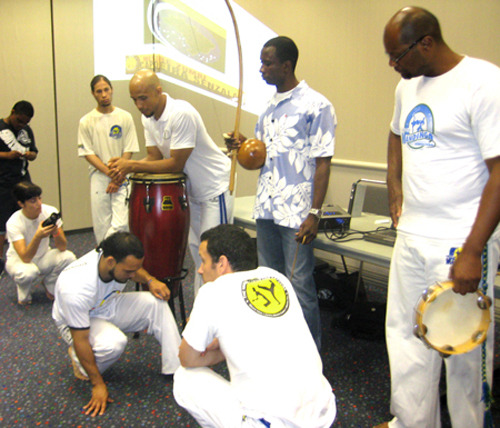Con Edison Immigrant Artist Program Newsletter, Issue No. 14
Featured Organization: Cidadão Global
This month the IAP is thrilled to feature Cidadão Global (CG) a community-based, social justice organization doing groundbreaking work with low-income Brazilian immigrants based primarily in the New York City area. CG is dedicated to promoting and defending the human rights of immigrants and strengthening citizen participation and collaboration within the Brazilian community. Among its member are artists and culture workers who benefit from its programs, which include ESL classes, public service and healthcare referrals, legal services, job search assistance, social venture development, and leadership training. The following piece is taken from an interview with Ramona Ortega, CG ’s Executive Director, conducted by IAP Program Officer Karen Demavivas.
How did CG begin?
In 2007, Ortega and some Brazilian friends addressed the fact that the Brazilian community lacked a leading political voice on immigration and social justice issues as well as a proper community resource to help people navigate the system. For instance, Ortega would often receive requests from capoeiristas on how to find immigrant services. In addition, there was a lack of experience on community organizing among Brazilians, which is a new concept for a population that has only engaged in segmented forms of business associations, church groups, and cultural organizations. Cidadão Global was then born as the only Brazilian community-based organization to address these concerns. Ortega came on board as CG’s Executive Director with her knowledge of non-profits and experience as the former director of the Human Rights Project at the Urban Justice Center. Since then, CG has received critical support and was awarded a prestigious Union Square Award for Social Justice in 2009.
How does CG perceive the connection between art and social justice?
CG’s mission and discussions around social justice come out of Afro-Brazilian cultural traditions such as samba, capoeira, and maracatu, which provided expressive force to the Afro-Brazilian political movement for liberation in Brazil. Grounded in this history, CG values the power of creativity in mobilizing social change.
How do artists versus activists approach activism?
The gap is in the follow-up. Afro-Brazilian artists have the socio-political consciousness, but often do not pursue concrete action beyond an event or performance. For a social justice organization like CG, awareness raising is not enough; there needs to be a focus on active participation and long-term impact. CG can provide artists with this follow-up. For example, when CG attended a screening on a documentary entitled Rhythmic Uprising about artist-activists in Bahia, it ended with a Q & A with the director. CG took it a step further by partnering with the director and subsequently providing more visibility for the film with a screening at the US Social Forum.
How does CG engage with artists and culture workers in its work?
CG connects many artists and culture workers in its membership base with resources and services across its programmatic areas. The organization also highlights cultural events and performances on its website and other online social networking sites such as Facebook and Twitter. In addition, CG provides artists with space to do classes and workshops on samba, capoeira and other types of creative expressions.
CG is open to more specific opportunities for cultural collaboration. For International Workers’ Day this past May, the organization worked with a Brazilian photographer to present dignified portraits of Brazilian domestic workers in an exhibition at Art House Astoria. At the US Social Forum last month, CG collaborated with a capoeira group to deliver a workshop on capoeira as a means for community organizing. The organization also taps into the creative skills of its membership base such as a filmmaker who helped CG produce an online video to encourage the Brazilian community to participate in the 2010 Census. Furthermore, musicians have been called upon for events such as CG’s fundraising party where a DJ played Afro-Brazilian funk music. As part of the Union Square Awards grantee network, CG has also engaged with cultural organizations that were recipients of the Union Square Arts Awards.
How has CG’s social entrepreneurship program engaged in the creative economies?
CG has supported an Afro-Brazilian women’s cooperative in an impoverished settlement (favela) in Rio de Janeiro. This group called Cooperativa Bordadeiras da Coroa makes handbags and clothing to sell in order to fund their political work. The organization buys what they make and sells them to supporters in NYC. CG thereby enables the cooperative’s economic mobility, which paves the way for their political participation.
What are CG’s next steps?
CG is focused on building its Brazilian membership and community base. Its door-to-door outreach to the Brazilian community for the 2010 Census brought more attention to CG’s work and, in turn, CG learned more about the community’s concerns. However, the results of the census data will not come out until next year and CG is now focused on a more detailed community survey to identify the needs of Brazilian immigrants in NYC.
In the coming year, CG will carry out more workshops on education (such as how to apply for community college), entrepreneurship, leadership development, holistic health (especially for domestic workers), and knowing one’s rights. Moreover, it is launching a cooperative to empower Brazilian domestic workers. CG will also continue to be a hub for artists and culture workers for referrals to grants and resources.
How can artists and culture workers get involved?
Signing up for a membership online with CG is free and so are the services it offers. In addition, people can get involved by participating in community and public events, attending monthly membership meetings, collaborating on a cultural project, and volunteering. Many of CG’s members are based in Queens, New Jersey and Mount Vernon, while some who were New York-based, have since moved back to Brazil. The organization encourages the engagement of its members rather than depending on administrative staff to run its programs. This is reflective of CG’s goal to build and empower a Brazilian community base.
What is CG’s take on the immigration reform debate?
The lack of immigration reform means that people need to keep the pressure on. What is happening with the Arizona law that calls for the more stringent enforcement of deportation is not just about the Mexican community; it is a threat to any immigrant population. Among CG’s constituents, there are personal stories of talented young people who fall under the need to pass the Dream Act, which would provide citizenship to children of illegal immigrants so that they can pursue higher levels of education in the United States. People need to have a political voice to address injustice. CG encourages this as an active part of the New York Immigration Coalition and Domestic Workers Congress. It has provided institutional muscle to get people out to lobby and march in the streets.
To learn more, visit Cidadão Global’s website.





